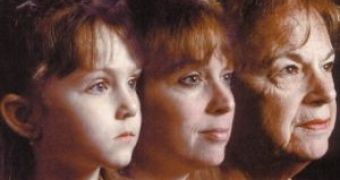We are a very odd species in many ways. For example, female animals too experience menopause and become sterile after a certain age, but this means a very close end to their lives. But women start releasing mature eggs at puberty age, and menstruation is installed at around the age of 13. By the age of 50, the egg release stops and women can outlive this on average some 25 to 30 years.
Biologists have been trying to explain this phenomenon: why women have such a limited fertility time, while men produce sperm throughout their lives. A newly released theory states that, in fact, grandmas boost the survival of their grandchildren.
A common theory says menopause impedes a woman to get pregnant later in her life, since it won't be able to deliver her baby protection and feeding during the long period of development till he'she becomes self-sufficient. The new theory says that by being freed from the reproductive task, the woman will be able to take care of her daughter's offspring, increasing in fact the survival of her own genes on the long term. To prove this, the team led by Daryl Shanley from the University of Newcastle in England analyzed historical demographic data gathered from 5,500 people inhabiting two villages in Gambia.
The study published in the Proceedings of the Royal Society B made computer simulations assessing population growth in various scenarios of women experiencing menopause at various ages.
The study showed that in the rare cases when women entered menopause after 50, they possessed a higher likelihood of dying in childbirth, leaving the child without good care. Moreover, babies' survival rates were increased when a maternal grandmother was around. "The Gambian data set and the information it reveals following careful analysis provides a uniquely rich insight into human life history in a natural mortality natural fertility setting. We clearly show that the most important benefit of menopause to a population is by freeing up potential grandmothers to provide care and not by protecting children from the death of their own mothers." said Shanley.
Human offspring clearly require extra care, and the grandmother on mother's line possesses the "greatest assured genetic interest," wrote the authors.
Other researches have revealed that the higher life expectancy in the modern society is delaying the age of the onset of menopause, and natural selection tends towards delayed menopause, according to the age when the woman decides to have a child.

 14 DAY TRIAL //
14 DAY TRIAL //